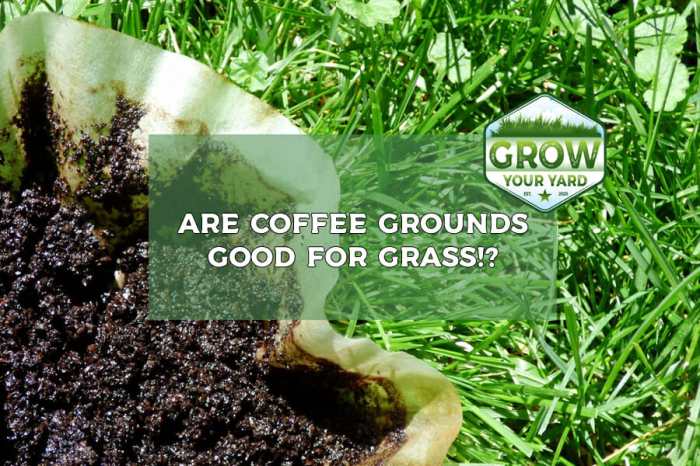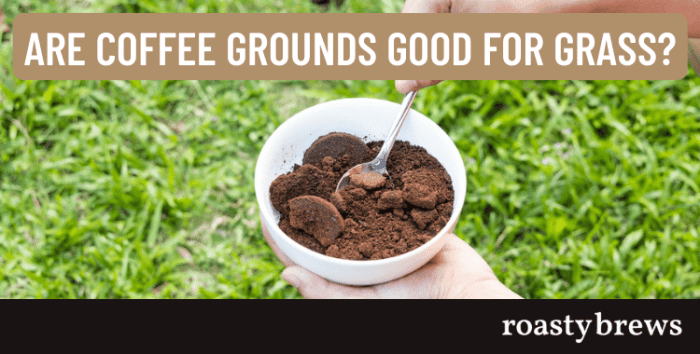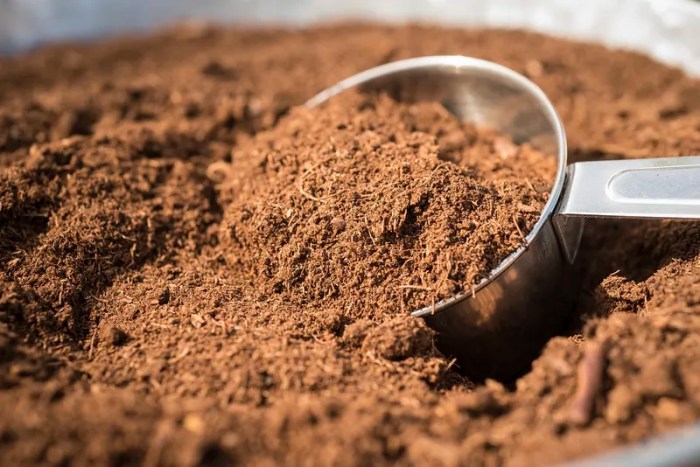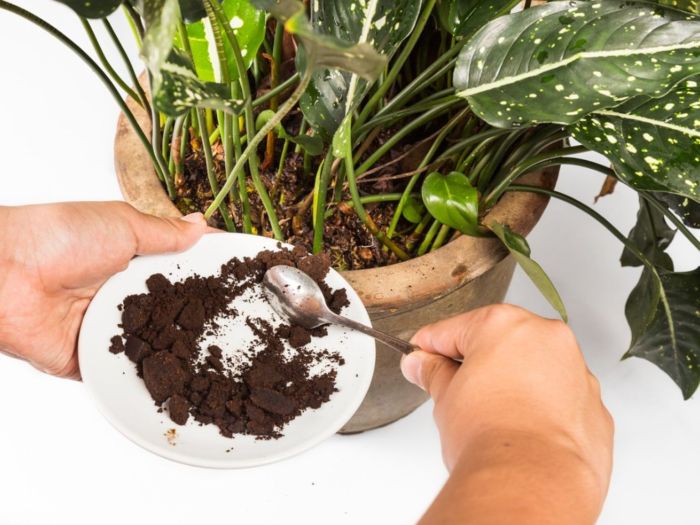Are coffee grounds good for grass? It’s a question that many gardeners and lawn enthusiasts ponder, especially those seeking eco-friendly ways to nurture their green spaces. The answer, as with most things in gardening, is a nuanced one. While coffee grounds offer a range of benefits for your lawn, there are also considerations to keep in mind.
Let’s delve into the world of coffee grounds and grass, exploring the pros, cons, and best practices for utilizing this readily available resource.
Coffee grounds are a natural byproduct of our morning ritual, and their rich composition can actually benefit our lawns. Packed with nitrogen, a crucial nutrient for healthy grass growth, coffee grounds can act as a natural fertilizer. They also improve soil structure, promoting better aeration and drainage, which can be a boon for compacted lawns.
Moreover, coffee grounds have been shown to deter certain pests and weeds, offering a natural pest control alternative.
Benefits of Coffee Grounds for Grass

Coffee grounds, a byproduct of our morning brew, can be a valuable addition to your lawn care routine. They offer a range of benefits for your grass, contributing to healthier, more vibrant growth.
Nutritional Benefits
Coffee grounds are a natural source of nutrients that can benefit your lawn. They are particularly rich in nitrogen, a crucial element for healthy grass growth. Nitrogen promotes the production of chlorophyll, giving your grass its vibrant green color. Coffee grounds also contain other essential nutrients like phosphorus, potassium, and magnesium, which contribute to overall plant health.
Improved Soil Structure and Aeration
Adding coffee grounds to your soil can improve its structure and aeration. The organic matter in coffee grounds helps to bind soil particles together, improving its water retention capacity. This is especially beneficial for sandy soils that tend to drain quickly.
Coffee grounds also enhance soil aeration by creating air pockets, allowing roots to breathe and grow more efficiently.
Suppression of Weeds and Pests
Coffee grounds can help suppress weeds and pests in your lawn. The high nitrogen content in coffee grounds makes the soil less hospitable to certain weeds, hindering their growth. Additionally, the caffeine in coffee grounds can act as a natural insecticide, deterring some pests from your lawn.
Applying Coffee Grounds to Grass

Applying coffee grounds to your lawn is a simple process that can be done in a few easy steps. The key is to use the right amount and apply them at the right time.
The Best Time to Apply Coffee Grounds
The best time to apply coffee grounds to your grass is in the spring or fall when the grass is actively growing. Applying them during these seasons will allow the coffee grounds to decompose more quickly and release their nutrients into the soil.
Coffee grounds are a great source of nitrogen, which is essential for healthy grass growth. But if you’re looking for a plant that thrives on a different kind of boost, check out my guide on how to fertilize a monstera , a tropical beauty that prefers a balanced fertilizer.
Just like your monstera, your lawn will thank you for the right kind of nourishment, whether it’s coffee grounds or a specialized fertilizer.
How to Apply Coffee Grounds to Grass
- Gather Your Coffee Grounds:Collect your used coffee grounds from your coffee maker. You can also ask your local coffee shop if they have any grounds they are willing to donate.
- Spread the Coffee Grounds:Sprinkle the coffee grounds evenly over your lawn. You can use your hands or a spreader to distribute the grounds.
- Water Your Lawn:After applying the coffee grounds, water your lawn thoroughly to help them decompose and release their nutrients.
The Optimal Amount of Coffee Grounds to Use
The optimal amount of coffee grounds to use per square foot is approximately 1/4 cup. Using too much coffee grounds can lead to an imbalance in soil pH and may even harm your grass.
It’s important to note that the amount of coffee grounds you use will vary depending on the size of your lawn and the type of grass you have.
Coffee Grounds and Grass Growth

Coffee grounds can have a noticeable impact on your lawn’s health and appearance. They act as a natural fertilizer, providing essential nutrients and improving soil structure. Let’s delve into the details of how coffee grounds influence grass growth.
Impact on Grass Growth Rate and Color
Coffee grounds are a rich source of nitrogen, an essential nutrient for healthy grass growth. Nitrogen promotes vigorous growth, resulting in a thicker, greener lawn. However, the impact of coffee grounds on growth rate is not always dramatic.
The effectiveness depends on several factors, including the type of grass, soil composition, and the amount of coffee grounds applied.
For optimal results, it’s crucial to apply coffee grounds in moderation. Excessive application can lead to an imbalance of nutrients, potentially hindering growth instead of promoting it.
While coffee grounds primarily contribute to a lush green appearance, they also play a role in promoting healthy root development. This, in turn, enhances the grass’s ability to withstand drought and other environmental stresses.
Comparing Coffee Grounds to Other Lawn Fertilizers, Are coffee grounds good for grass
Coffee grounds are a natural and readily available source of nitrogen, making them an attractive alternative to synthetic fertilizers. However, it’s important to understand their limitations.
- Nitrogen Content:While coffee grounds do provide nitrogen, their nitrogen content is relatively low compared to commercial fertilizers. You may need to apply a larger quantity to achieve the same results.
- Nutrient Profile:Coffee grounds are primarily a nitrogen source, lacking other essential nutrients like phosphorus and potassium. Combining coffee grounds with other natural fertilizers or using a balanced fertilizer program can ensure your lawn receives all the nutrients it needs.
- Slow-Release Nature:Coffee grounds release nitrogen gradually over time, making them a sustainable option. However, this slow-release nature means they may not provide an immediate boost to grass growth.
Potential Downsides of Using Coffee Grounds on Grass
While coffee grounds offer several benefits, it’s essential to be aware of potential drawbacks:
- Acidity:Coffee grounds are acidic. Excessive application can lower the soil pH, potentially affecting the growth of certain grass types that prefer neutral or slightly alkaline conditions. Regular soil testing is recommended to monitor pH levels and adjust application accordingly.
- Pest and Fungus Issues:Coffee grounds can attract slugs and snails, which can damage your lawn. Additionally, excessive application can create a moist environment that favors fungal growth, potentially leading to lawn diseases.
- Uneven Distribution:Applying coffee grounds evenly can be challenging, potentially leading to uneven growth patterns.
Coffee Grounds and Soil pH: Are Coffee Grounds Good For Grass

Coffee grounds can affect the pH of your soil, which is a crucial factor in plant growth. Understanding how coffee grounds influence soil pH and how to adjust it is essential for maximizing the benefits of using them on your lawn.
Soil pH and Coffee Grounds
The pH of soil measures its acidity or alkalinity. Most plants prefer a slightly acidic soil with a pH between 6.0 and 7.0. Coffee grounds are acidic, with a pH ranging from 4.5 to 6.5. When you add coffee grounds to your soil, they lower its pH, making it more acidic.
The acidity of coffee grounds is primarily due to the presence of chlorogenic acid.
So, you’re wondering if coffee grounds are good for your grass? It’s a common question, and the answer is a little complicated. It depends on the type of coffee grounds and the soil acidity. While they can add nutrients, they can also make the soil too acidic.
But if you’re looking for a way to add some extra oomph to your garden, why not try growing lisianthus? They’re stunning flowers that can add a touch of elegance to any garden. You can learn more about how to grow lisianthus here.
As for coffee grounds and your lawn, just remember to use them in moderation and test your soil pH regularly.
The degree to which coffee grounds affect soil pH depends on several factors, including:
- The amount of coffee grounds applied
- The initial pH of your soil
- The type of coffee grounds used (e.g., regular, decaffeinated, or espresso)
- The frequency of application
Adjusting Soil pH
If your soil becomes too acidic due to coffee grounds, you can adjust the pH by:
- Adding lime: Lime is a natural soil amendment that raises the pH of acidic soil. Apply lime according to the recommendations for your specific soil type and desired pH level.
- Using wood ash: Wood ash is another effective way to raise soil pH. However, it is essential to use wood ash from hardwood trees, as softwood ash can be acidic.
- Adding compost: Compost is rich in beneficial microorganisms that can help buffer soil pH and improve overall soil health.
Coffee Ground pH Levels
Here’s a table comparing the pH levels of different types of coffee grounds:
| Type of Coffee Grounds | pH Range |
|---|---|
| Regular Coffee Grounds | 4.5
|
| Decaffeinated Coffee Grounds | 5.0
|
| Espresso Grounds | 4.0
|
Sustainable Lawn Care with Coffee Grounds

Using coffee grounds as a lawn fertilizer aligns perfectly with sustainable lawn care practices. This natural approach minimizes reliance on synthetic chemicals, promotes soil health, and reduces the environmental impact of lawn maintenance.
Alternative Methods for Improving Soil Health and Grass Growth
By incorporating coffee grounds into your lawn care routine, you’re adopting a sustainable approach. Here are some other methods that promote a healthy lawn while minimizing environmental impact:
- Composting:Composting kitchen scraps and yard waste creates nutrient-rich compost that can be used as a natural fertilizer. This reduces the need for synthetic fertilizers and helps improve soil structure.
- Mulching:Leaving grass clippings on the lawn after mowing acts as a natural fertilizer, returning nutrients to the soil. This practice reduces the need for additional fertilization and helps improve soil health.
- Cover Crops:Planting cover crops, such as clover or ryegrass, during the off-season can help improve soil health and suppress weeds. These crops add organic matter to the soil, enhance nutrient cycling, and provide erosion control.
- Water Wisely:Deep watering less frequently encourages deeper root growth, making your lawn more drought-tolerant. This conserves water and reduces the need for frequent watering.
- Organic Pesticides:When pests become a problem, consider using organic pesticides instead of synthetic ones. These options are less harmful to beneficial insects and the environment.
Environmental Impact of Coffee Grounds vs. Synthetic Fertilizers
The following table compares the environmental impact of using coffee grounds versus synthetic fertilizers:
| Factor | Coffee Grounds | Synthetic Fertilizers |
|---|---|---|
| Production | Minimal environmental impact, as coffee grounds are a byproduct of coffee production. | High environmental impact due to the mining of raw materials and the manufacturing process. |
| Transportation | Typically sourced locally, reducing transportation emissions. | Often transported long distances, increasing emissions. |
| Nutrient Runoff | Slow-release nutrients, minimizing runoff and water pollution. | Fast-release nutrients, increasing the risk of nutrient runoff and water pollution. |
| Soil Health | Improves soil structure and promotes beneficial microbial activity. | Can deplete soil nutrients and harm beneficial organisms. |
Using coffee grounds as a fertilizer aligns with sustainable lawn care practices, reducing reliance on synthetic chemicals and promoting soil health.
Outcome Summary

So, are coffee grounds good for grass? The answer is a resounding yes, with a few caveats. While coffee grounds can offer a wealth of benefits for your lawn, understanding their impact on soil pH and using them judiciously is key.
By incorporating coffee grounds into your lawn care routine, you can enjoy a greener, healthier lawn while embracing a more sustainable approach to gardening.